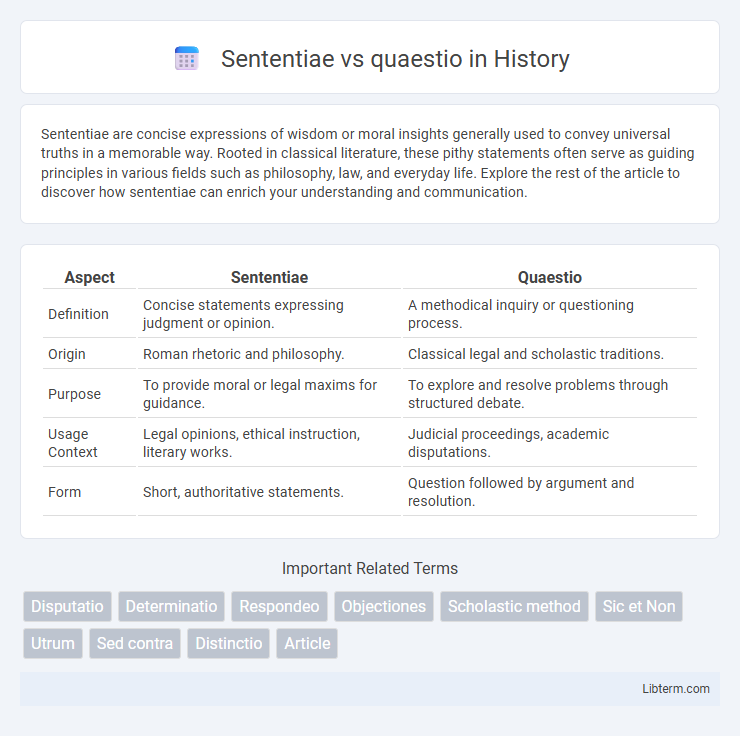Sententiae are concise expressions of wisdom or moral insights generally used to convey universal truths in a memorable way. Rooted in classical literature, these pithy statements often serve as guiding principles in various fields such as philosophy, law, and everyday life. Explore the rest of the article to discover how sententiae can enrich your understanding and communication.
Table of Comparison
| Aspect | Sententiae | Quaestio |
|---|---|---|
| Definition | Concise statements expressing judgment or opinion. | A methodical inquiry or questioning process. |
| Origin | Roman rhetoric and philosophy. | Classical legal and scholastic traditions. |
| Purpose | To provide moral or legal maxims for guidance. | To explore and resolve problems through structured debate. |
| Usage Context | Legal opinions, ethical instruction, literary works. | Judicial proceedings, academic disputations. |
| Form | Short, authoritative statements. | Question followed by argument and resolution. |
Introduction to Sententiae and Quaestio
Sententiae and quaestio represent fundamental concepts in classical rhetoric, where sententiae are concise, memorable statements or maxims conveying universal truths, often employed to persuade or emphasize key points. Quaestio refers to the method of formulating and exploring a question or problem in depth, serving as a critical component in dialectical argumentation to analyze issues systematically. Understanding the distinction between sententiae as authoritative assertions and quaestio as investigative inquiry enhances effective argument construction and rhetorical analysis.
Historical Origins of Sententiae
Sententiae originated in classical Latin rhetoric as concise, memorable sayings used to convey moral truths or general wisdom, often found in the works of Cicero and Seneca. These brief, impactful statements functioned as rhetorical devices to persuade or emphasize arguments, contrasting with quaestio's focus on questioning and investigation in Roman legal and philosophical traditions. Sententiae's historical roots lie in their role within Roman education and literature, serving as foundational tools for teaching ethical principles and effective communication.
Historical Development of Quaestio
The historical development of quaestio traces back to Roman legal tradition, where it evolved as a formal judicial inquiry distinct from sententiae, which were authoritative legal opinions. Quaestio became central to addressing complex legal disputes through systematic investigation and fact-finding, shaping procedural law and influencing the structure of later Western legal systems. Over time, quaestio fostered a methodical approach to trial proceedings, emphasizing evidence examination and due process in contrast to the more declarative nature of sententiae.
Core Definitions: Sententiae Explained
Sententiae are concise expressions of a general truth, moral principle, or opinion, often used to convey wisdom or ethical guidance in a brief, memorable format. Unlike quaestio, which involves posing questions or exploring problems, sententiae provide definitive statements that assert a clear stance or judgment. These concise maxims serve as foundational elements in rhetoric and philosophical discourse to summarize and reinforce key ideas.
Core Definitions: Quaestio Explained
Quaestio, in classical rhetoric, refers to the central question or issue under debate, forming the basis for argumentation and inquiry. Unlike sententiae, which are concise statements of opinion or moral wisdom often used to persuade, quaestio serves to clarify the problem that requires resolution. This methodical framing guides the discourse by identifying the point of contention essential for effective argument.
Structural Differences Between Sententiae and Quaestio
Sententiae are concise, definitive statements expressing judgments or opinions, structured around clear, closed-ended assertions. Quaestio involves open-ended questions designed to provoke inquiry and exploration, often structured with interrogative syntax that encourages analysis. The fundamental structural difference lies in sententiae presenting conclusions while quaestio presents problems to be solved.
Philosophical and Rhetorical Functions
Sententiae function as concise, memorable statements conveying universal truths or moral wisdom, serving as persuasive tools in rhetoric and foundational elements in philosophy for summarizing complex ideas. Quaestio, in contrast, operates as an interrogative device that stimulates critical inquiry and dialectical reasoning by posing questions that challenge existing assumptions and invite exploration. Together, sententiae and quaestio shape philosophical discourse by balancing definitive assertions with probing skepticism, enhancing argumentative depth and clarity.
Usage in Medieval Scholasticism
Sententiae and quaestio were central to medieval scholasticism, with sententiae representing authoritative statements or propositions drawn from Church Fathers and classical texts used to establish foundational truths. Quaestio functioned as a methodical form of inquiry, framing specific theological or philosophical questions to stimulate dialectical reasoning and debate. This structured dialectic between sententiae and quaestio shaped scholastic disputations, promoting rigorous analysis and synthesis of doctrinal knowledge.
Modern Interpretations and Relevance
Modern interpretations of sententiae emphasize their role as concise moral maxims or aphorisms used to encapsulate ethical principles or legal reasoning, often cited in rhetoric and philosophy to persuade and instruct. Quaestio refers to the structured method of inquiry and problem-solving, foundational in contemporary legal and academic discourse for developing arguments and exploring complex issues systematically. The relevance of both lies in their complementary functions: sententiae provide authoritative statements for guiding judgment, while quaestio fosters critical analysis and debate, integral to modern jurisprudence and scholarly practice.
Conclusion: Comparative Insights
Sententiae and quaestio represent distinct rhetorical techniques where sententiae encapsulate concise, authoritative statements often used for emphasis, while quaestio involves structured inquiry driving critical analysis. Comparative insights reveal that sententiae serve to solidify arguments through memorable aphorisms, enhancing persuasion and clarity, whereas quaestio fosters deeper exploration by posing questions that challenge assumptions and stimulate discourse. Effective rhetorical strategies integrate sententiae's conclusive impact with quaestio's interrogative depth to achieve balanced and compelling communication.
Sententiae Infographic

 libterm.com
libterm.com